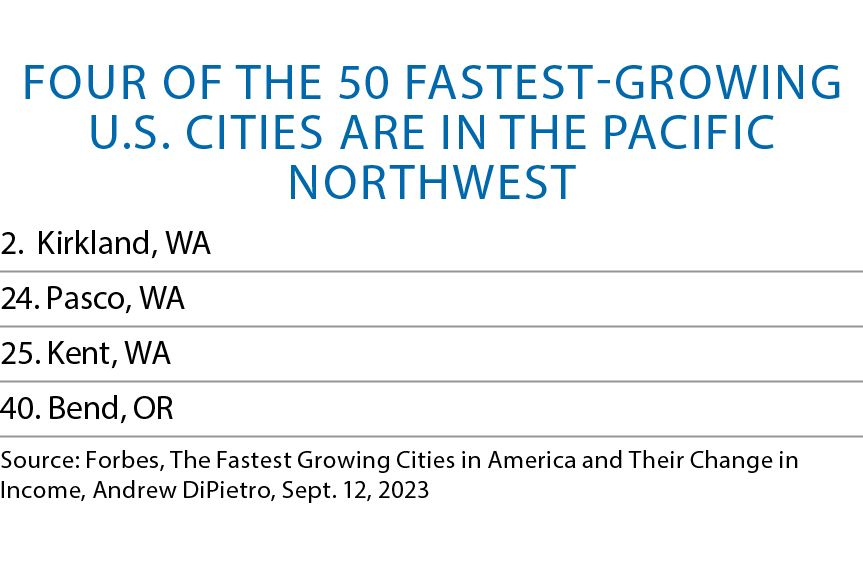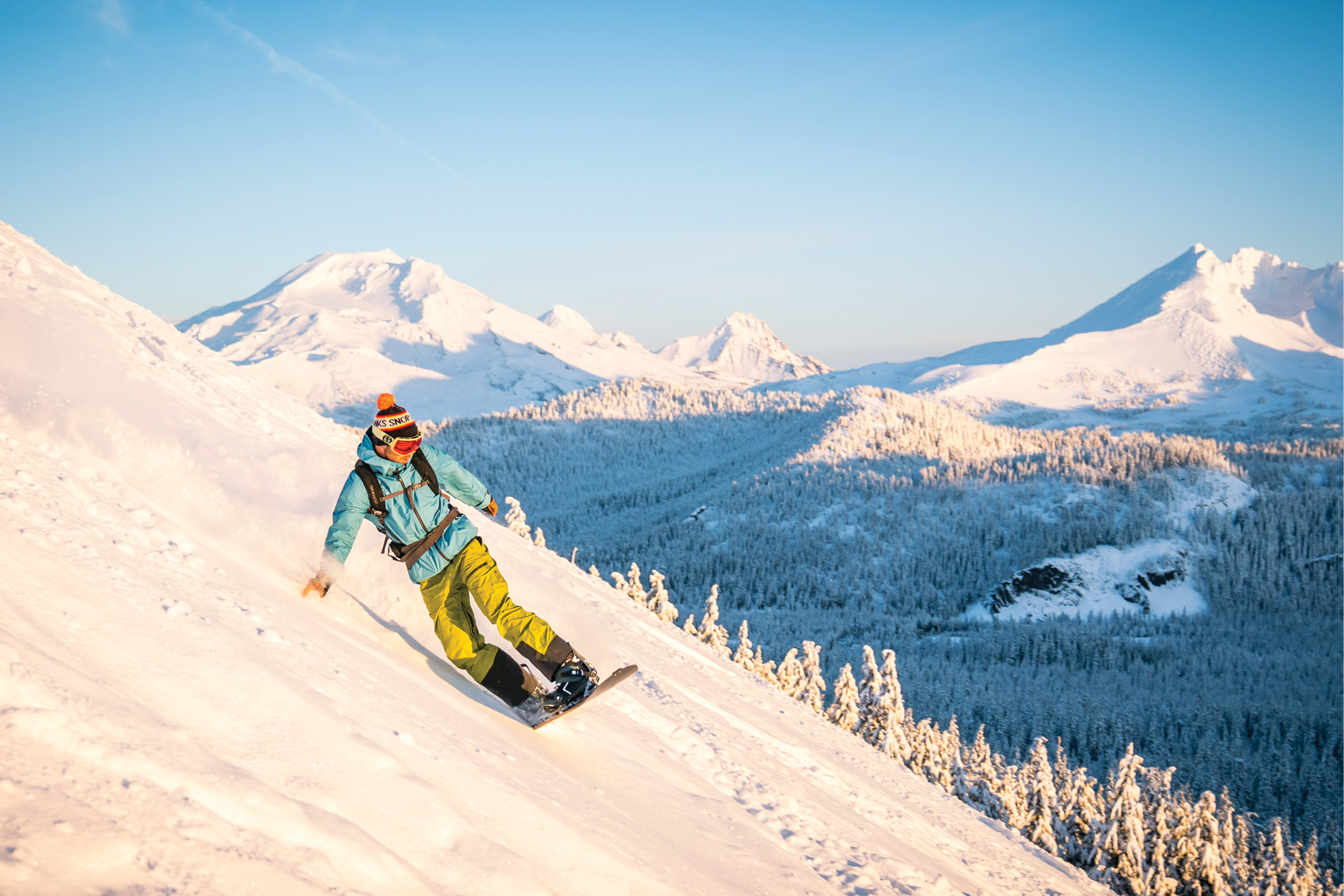Four of the 50 fastest-growing cities in America are in the Pacific Northwest. Business leaders in the region attribute their success to factors they say they find there in abundance.
Altitude Beverages LLC is a case in point. Thomas Angel, co-founder and president of this brewery that provides an alcohol-free alternative, says he and his wife Laura Melgarejo-Silva chose to build their business in Bend, Oregon, because of lifestyle factors associated with their brand.
Bend was recently named by Forbes as one of the 50 fastest-growing cities in the nation. So were three cities in Washington: Kent, Kirkland and Pasco. The cities have several things in common, according to Forbes: fast-rising population, rapidly rising income and solid business growth.
Bend, located in Central Oregon, saw its population grow 28% from 75,000 in 2011 to over 97,000 in 2021 and today an estimated 104,906.
“We moved from Beijing to Bend to start this business in 2020,” says Angel. “I had been working for Boeing, and we got stuck in China in March 2020 when COVID-19 broke out. At my core, I am an entrepreneur. I was doing startups outside of class back in college. I took the job at Boeing to pay the bills and stayed there for 10 years, but I always wanted to start my own company.”
Saving up seed capital, Angel decided to branch out on his own when the world shut down. Another factor prompted his life and career change, he adds: “Our relationship with alcohol changed. We still wanted to enjoy our social life, but we decided that we wanted to enjoy it without alcohol. Back then, it was rare to find anything non-alcoholic at a bar. So, we together decided to create our own alternative beverage company.”
Born of this life change was Altitude Beverages LLC in Bend. “Our goal was to create a brand that aligns with feeling part of the scene and the social occasion,” Angel says. “But we also asked ourselves another question: Where do we want to start this company?”
An aviation software developer by trade, Angel says that “we needed to go someplace where there is expertise for brewing. I had grown up in the Portland area, so I knew of Bend, which was known as a popular vacation destination. I also knew it as a brewery town. My brother moved here when I moved to China. He came here to work on a coffee startup.”
Angel and his wife took their time in choosing a location. “We evaluated San Diego, Seattle and Bend,” he says. “We spent about a month in each place before we made our decision. We toured each city during the summer of 2020 during the lockdowns. Obviously, that was not an ideal time to do this.”
Each location had its selling points, he notes. “San Diego is a wonderful place, but we found it hard to tap into the beverage community there,” he says. “In Bend, within our first week of being here, we had met with multiple brewery owners. We quickly realized that this was a place that welcomed new ideas. If you are passionate about your idea, this community will support you. That is how we ended up in Bend.”
Brand Fits with Area Culture
Angel says several factors make Bend a natural choice for his company. “It punches above its weight. It has only a little over 100,000 people, but it feels bigger than that,” he says. Moreover, “People pitch in and help each other here.”
Among other factors, “It is a higher-income location and a second-home destination,” Angel notes. “Because of the higher discretionary income in Bend, you don’t have to compete on the lowest price.”
Oregon also has wonderful agricultural resources that not every state has, he says. And “there is a priority placed on local brands. We are an active outdoor lifestyle brand, and that is a perfect fit in Bend.”

Angel says the Economic Development for Central Oregon organization has been a big help. “We have worked with both EDCO and Cultivate Bend, which is a natural products trade organization,” he says. “We have also met with the local reps of Business Oregon and with the state office in Salem.”
He had heard some stories about potential business climate issues in Oregon, but says his experience so far has been positive. “What drew our business here was the entrepreneurial community,” he says. “My family moved here from Nashville when I was a kid. Rugged individualism is the ethos here — going back to the Oregon Trail and the first people who settled here. Just like the original settlers, we are going to make the best possible opportunity out of this.”
Washington’s Trifecta of Growth
Around the Pacific Northwest, plenty of businesses are making the best of their opportunities. Jacob Gonzalez, community and economic development director for the City of Pasco, says business is booming everywhere he turns in his community of 80,863 people.
“Freight logistics and warehousing related to production are growing here,” he says. “We have welcomed a 2-million-square-foot Amazon warehouse to the city, and that is in addition to a recent expansion from Local Bounty out of Montana. They opened a 200,000-sq.-ft. plant here. Darigold is building North America’s largest waste-processing plant here; and about 20% of our employment is based around construction.”
Factors driving growth in Pasco include space availability; access to various transportation options; and the presence of a significant rail hub. “Right now, we are working with the Port of Pasco and the Washington State Department of Commerce to develop an aerospace manufacturing cluster here in the Tri-Cities area.”
William Ellis, chief economic development officer for the City of Kent, says that “thanks to rapid job growth in the Kent Valley, we’ve seen wages, jobs and population increases.” Kent, part of the metro Seattle-Tacoma-Bellevue region, has 132,812 people.
“The fastest-growing aerospace company in America, Stoke Space Technologies, is opening a new headquarters in Kent not far from the Boeing Space, Security and Defense campus and Blue Origin headquarters,” says Ellis.
Kirkland is the second fastest-growing city in America, increasing its population by 89.6% from 48,334 in 2011 to 91,656 in 2021. During that same time, Kirkland saw its median household income grow by 37.5% to $121,998.

